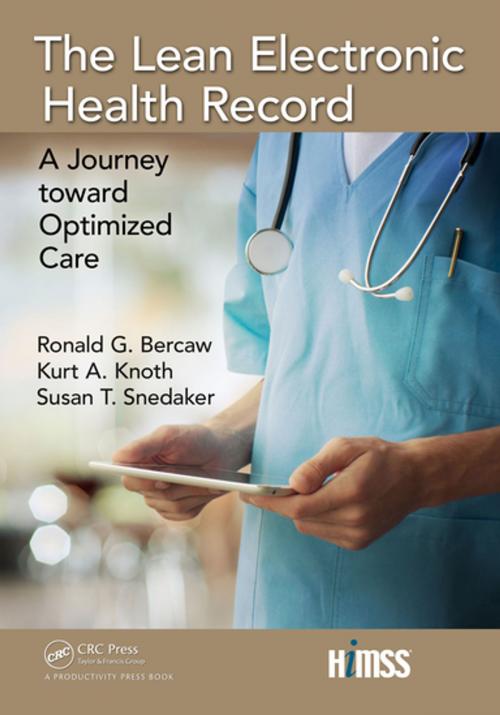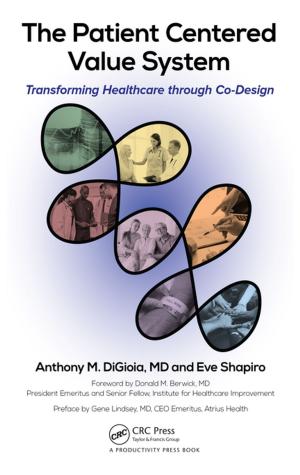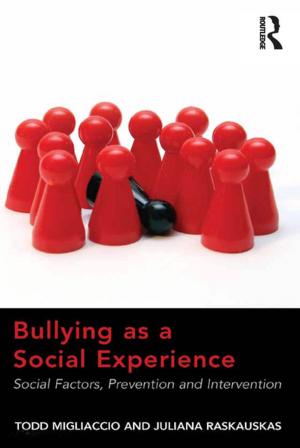The Lean Electronic Health Record
A Journey toward Optimized Care
Nonfiction, Health & Well Being, Medical, Reference, Administration, Business & Finance, Management & Leadership, Production & Operations Management, Industries & Professions, Industries| Author: | Ronald G. Bercaw, Kurt A. Knoth, Susan T. Snedaker, MBA, CISM, CPHIMS, C | ISBN: | 9781351850957 |
| Publisher: | Taylor and Francis | Publication: | December 15, 2017 |
| Imprint: | Productivity Press | Language: | English |
| Author: | Ronald G. Bercaw, Kurt A. Knoth, Susan T. Snedaker, MBA, CISM, CPHIMS, C |
| ISBN: | 9781351850957 |
| Publisher: | Taylor and Francis |
| Publication: | December 15, 2017 |
| Imprint: | Productivity Press |
| Language: | English |
The Electronic Health Record (EHR) is a reflection of the way your organization conducts business. If you’re looking to make lasting improvements in the delivery of care, you must start with looking at the system from your patient’s perspective to understand what is of value and what is simply waste. When you begin seeing in this way, you’ll begin building in this way. When you begin building in this way, you’ll begin driving improvements in your care delivery. Only then will your EHR be able to support lasting improvements, driving better patient care and outcomes at lower costs.
Healthcare organizations are under increasing pressure to improve on all fronts. This can be achieved, but only by changing the very way we look at care. No longer can we look at care just from the organization or provider’s perspective; we must start with the end in mind – the patient. Compelling case studies, discussed throughout this book, demonstrate that modifying processes and workflows using Lean methodologies lead to substantial improvements. These changes must be undertaken in a clear, consistent, and methodical manner. When implementing an EHR based on existing workflows and sometimes antiquated processes, organizations struggle to sustain improvements.
Many organizations have deployed an EHR and now face optimization challenges, including the decision to move to a new EHR vendor. The financial implications of upgrading, optimizing or replacing an EHR system are significant and laden with risk. Choose the wrong vendor, the wrong system, or the wrong approach and you may struggle under the weight of that decision for decades. Organizations that successfully leverage the convergence of needs – patients demanding better care, providers needing more efficient workflows and organizations desiring better financials – will survive and thrive.
This book ties together current healthcare challenges with proven Lean methodologies to provide a clear, concise roadmap to help organizations drive real improvements in the selection, implementation, and on-going management of their EHR systems. Improving patient care, improving the provider experience and reducing organizational costs are the next frontier in the use of EHRs and this book provides a roadmap to that desired future state.
The Electronic Health Record (EHR) is a reflection of the way your organization conducts business. If you’re looking to make lasting improvements in the delivery of care, you must start with looking at the system from your patient’s perspective to understand what is of value and what is simply waste. When you begin seeing in this way, you’ll begin building in this way. When you begin building in this way, you’ll begin driving improvements in your care delivery. Only then will your EHR be able to support lasting improvements, driving better patient care and outcomes at lower costs.
Healthcare organizations are under increasing pressure to improve on all fronts. This can be achieved, but only by changing the very way we look at care. No longer can we look at care just from the organization or provider’s perspective; we must start with the end in mind – the patient. Compelling case studies, discussed throughout this book, demonstrate that modifying processes and workflows using Lean methodologies lead to substantial improvements. These changes must be undertaken in a clear, consistent, and methodical manner. When implementing an EHR based on existing workflows and sometimes antiquated processes, organizations struggle to sustain improvements.
Many organizations have deployed an EHR and now face optimization challenges, including the decision to move to a new EHR vendor. The financial implications of upgrading, optimizing or replacing an EHR system are significant and laden with risk. Choose the wrong vendor, the wrong system, or the wrong approach and you may struggle under the weight of that decision for decades. Organizations that successfully leverage the convergence of needs – patients demanding better care, providers needing more efficient workflows and organizations desiring better financials – will survive and thrive.
This book ties together current healthcare challenges with proven Lean methodologies to provide a clear, concise roadmap to help organizations drive real improvements in the selection, implementation, and on-going management of their EHR systems. Improving patient care, improving the provider experience and reducing organizational costs are the next frontier in the use of EHRs and this book provides a roadmap to that desired future state.















